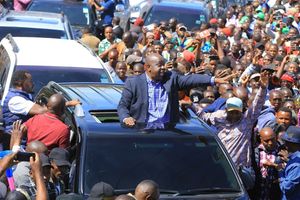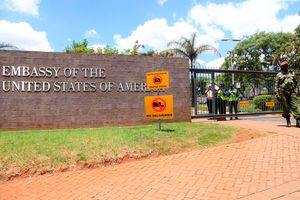
Police officers fire teargas at protesters in Kisumu City.
I still hear the cries sometimes. “Ua! Ua! (Kill! Kill!)” screamed police officers in full riot gear, charging at unarmed protesters with bloodlust in their eyes. The BBC team had asked me to watch the footage during our interview last year when they were filming their documentary that just came out—Blood Parliament.
It is chilling. Heartbreaking. Such blatant disregard for life. The same disregard the police officer who shot a young man during the Majengo protests had, dancing as the body lay there.
The BBC documentary revealed a lot. And one of the most shocking revelations was the involvement of the Kenya Defence Forces (KDF) in the killings of innocent protesters. This revelation stunned many Kenyans who had for years viewed the military as the final line of professionalism, a force loyal to the country, not the government. Now, that trust is shattered.
Under whose orders did they carry out these brutalities? It is a question hanging heavily in the national conscience. Because if even the KDF, long seen as disciplined and apolitical, can be deployed against civilians, then is there any institution left we can truly trust? The painful answer is no. We are witnessing the total capture of critical State institutions.
Just the other day, the head of the National Intelligence Service, a body that should be fiercely apolitical, came out to issue public warnings to citizens regarding political matters. When the intelligence agency itself feels entitled to intimidating citizens, it signals a complete collapse of independence.
We have the Inspector-General of Police addressing political rallies. We have the Independent Policing Oversight Authority sitting on hundreds of bullets retrieved from bodies of protesters, doing nothing with the evidence even when ballistic tracing could easily identify officers involved. We have Parliament, which is supposed to provide oversight, but is instead reducing itself to a cheering squad for the Executive. Every institution that was supposed to check power has now been compromised.
And when those in power capture every institution, citizens have no refuge. They have no independent bodies to turn to. They have no impartial courts to hear their cries. They are left to fend for themselves and that is exactly what they are doing.
Personal risk
One of the most powerful parts of the BBC documentary was how it was put together: not just by traditional journalism, but by painstakingly analysing over 5,000 videos and photos taken by protesters, citizens and professional photographers who were on the ground. Even when police officers had their faces fully covered to avoid identification, BBC investigators were able to piece together enough evidence from different angles, different moments, to unmask them.
This is no small feat. And it was made possible because ordinary Kenyans refused to allow their pain to be erased. Protesters, at great personal risk, documented everything. They filmed as friends were beaten. They photographed the faces behind the masks. They circulated videos, real-time evidence, knowing that State institutions would later try to rewrite or bury the truth.
It’s a powerful reminder: this generation of Kenyans is proving to be resilient, self-reliant and profoundly aware of the importance of documentation. In a country where the State controls narratives through captured institutions, the camera has become a weapon of truth. While the institutions collapse, the people are rising.
But this also exposes a brutal reality—when institutions are captured by the State, power does not disappear, it simply gets concentrated into fewer hands. It becomes more ruthless. More desperate to cling on. And so the State responds to truth-telling with violence, because violence is the only thing it has left to maintain control.
We are not just up against corrupt individuals; we are up against a system where every mechanism of accountability—Parliament, police oversight bodies, courts, the military—are working against us. And the danger is that, if left unchecked, it leads to total impunity. Today it is protesters. Tomorrow it will be anyone who dares question authority.
Captured institutions
That is why the moment we are living through is so critical. We cannot afford to be naive. We cannot pretend that justice will come from within these captured institutions; at least not right now.
The solution lies, first, in building parallel forms of accountability. Civil society must step in to document, to expose, to advocate. Organisations must network across borders because local institutions are too compromised. International human rights bodies, diaspora communities and independent media must become key partners.
Second, we must invest in civic education. A citizenry that understands its rights is far harder to silence. Knowledge of the Constitution must become common, not just among lawyers, but among boda boda riders, mama mbogas, university students and factory workers. Rights can only be defended if people know they exist.
Third, we must protect and expand independent media. We need more homegrown investigative journalism, more platforms that will be resilient to attempts to silence them. .
Fourth, we need strategic solidarity. The political class thrives when it can divide us along tribal, regional, or class lines. But justice is not tribal. Freedom is not tribal. We must learn to protect each other, even when the victim does not look like us.
Finally, we, the people, must not lose faith in our own power. When I see young Kenyans filming police violence with shaky hands but steady courage, when I see photojournalists risking arrest to tell the truth, when I see communities refusing to be cowed even when faced with live bullets, I know we have something stronger than any captured institution. And history shows that no captured institution, no matter how powerful, can stand forever against a people who refuse to be broken.
The journey ahead for Kenyans will not be easy. It will require patience, sacrifice and relentless courage. It requires us to rely on each other.
But we have been here before. We have faced injustice before. And every time, when it seemed impossible, when it seemed hopeless, we Kenyans found the strength to rise. We forged ahead. We won ground. And we will again.










